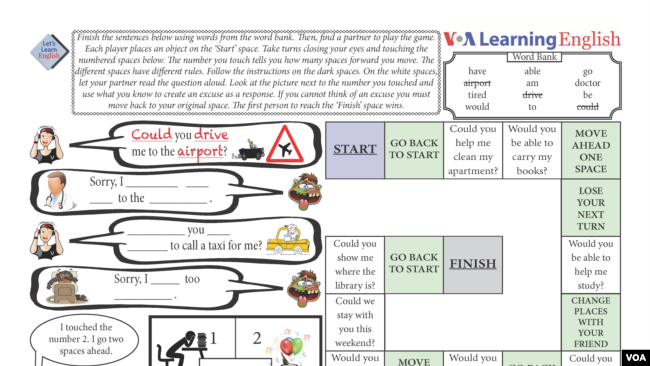Summary
Anna lost her wallet and needs to go to her class. She is calling her friends to get help. Who will help her find money for the train?Speaking
In this video, learn how to say the new words. Then learn about using modal verbs, like "would" and "could," to ask for help politely.Pronunciation
Use this video to learn about using informal pronunciation with "what are you" and "would you."Conversation
Anna: Hey there! Tonight, I am teaching my ukulele class. It is far away. So, I am going to ride the Metro. Oh, no! I lost my wallet! It has my Metro card, my credit card and my money! Oh, no!
Anna: It's times like this I remember my father’s important words. He said, “Anna, never … ” No wait, “Always have emergency money.” .” (Anna pulls an envelope out of her bag and looks inside) It's empty. Time for Plan B. ‘Extra Emergency Money.’ (Anna pulls another envelope out of her bag and looks inside)
Anna: No! It's empty too! Anna, it's time for Plan C.
Anna: Hi, Marsha!
Marsha: Hi Anna. What’s up?
Anna: I’m stuck downtown without any money. Would you be able to come downtown? Please?
Marsha: Anna, I can’t. I’m too busy. I have to give a big presentation in one hour. Sorry!
Anna: That's ok. Good luck with your presentation!
Marsha: Thanks!
Anna: Time for Plan D.
Anna: Hi, Jonathan! How’s it going?
Jonathan: Hey, Anna. Things are great. What’s up?
Anna: Well, I was wondering if you could give me some money.
Jonathan: What?
Anna: See, I lost my wallet and I’m stuck downtown and I --
Jonathan: Anna, I wish I could. I'm at the airport with my mother. Her flight leaves in two hours.
Anna: That’s okay. Tell your Mom to have a nice trip!
Jonathan: I do wish I could help. Thanks.
Anna: 'Bye.
Anna: This is serious. Time for … Plan E.
Ashley: Hello.
Anna: Hi, Ashley! What are you doing?
Ashley: Oh! Hi Anna!
Anna: (Anna hears a child crying through the phone.) Ashley, I was wondering, uh, would you be able to come downtown? And could you give me $20?
Ashley: Anna, I can’t.
Anna: I’ll pay you back the money. I promise.
Ashley: Anna, I’m not worried about the money. I’m babysitting. (off-camera to niece) That was very, very, bad!
Anna: Well, losing your wallet is bad, but it's not the end of the world, Ashley.
Ashley: I was talking to my niece, Anna.
Anna: Well, thanks anyway, Ashley!
Ashley: Good luck getting money.
Anna: Good luck babysitting!
Ashley: Thanks.
Anna: Well, Plans A, B, C, D and E did not work. Think, Anna, think. Time for Plan F.
Anna: (singing) Won't you give, could -- Thank you very much, sir! -- would you give me money, won't you give -- Thank you very much! -- could you give, won't you give me money -- until next time! -- won't you give me money?
Writing
In this lesson, Anna needs help from a friend. Did you ever have a problem that a friend helped you to solve? Write to us by email or in the Comments section.Click on the image below to download the Activity Sheet and practice using what you know to make polite requests and excuses.
Learning Strategy
Learning Strategies are the thoughts and actions that help make learning easier or more effective.The learning strategy for this lesson is Use What You Know. When we use what we know, we solve problems in communication by thinking of familiar words or structures, and trying to communicate with them.
In this lesson, Anna learns that her friends cannot help her. She uses what she knows, playing the ukulele, to get the money she needs to ride on the train.
Do you ever use what you know when you speak English? Write to us about it in the Comments section or send us an email. Teachers, see the Lesson Plan for more details on teaching this strategy.

No comments:
Post a Comment